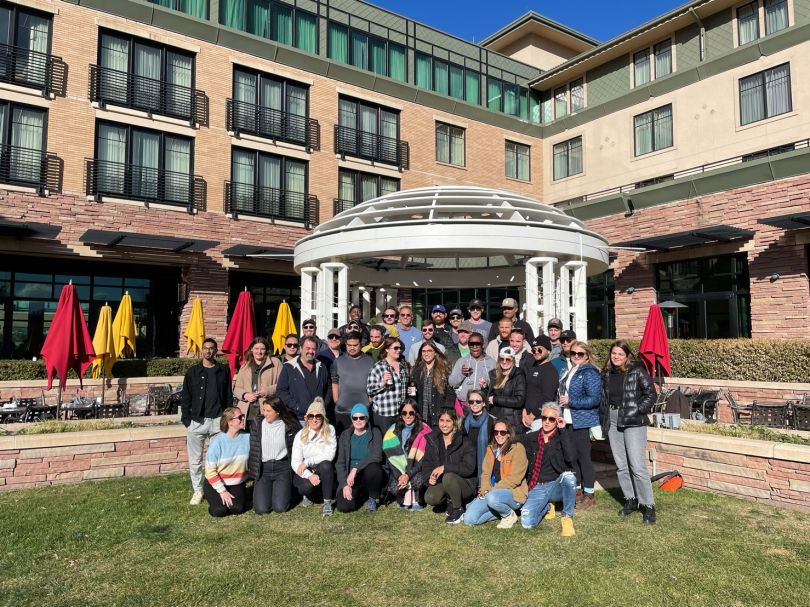When it comes to diversity, there are two kinds — who you are and where you’ve been. A successful sales team needs both.
Harvard Business Review (HBR) describes this divide as inherent diversity vs. acquired diversity. Inherent diversity is what most people think of when they hear the word — having people of different ethnicities, genders, sexual orientations and other similar characteristics. On the other hand, acquired diversity relates to experience — education, work and exposure to other places and people. Teams with both have what HBR calls 2-D diversity.
This diversity is the key to a sales team’s success. Having a variety of perspectives means that someone can always see what another team member misses — and combining those perspectives leads to creative, unexpected solutions. Harvard Business Review’s study on the subject found that employees at companies with 2-D diversity were 70 percent more likely to report that their company captured a new market in the past year — because the team could think outside the box.
When a company starts out, it’s easier to keep this in mind as they carefully interview and assess every candidate in relation to the current team. But as a sales team grows, it’s especially important for its leader to keep 2-D diversity in mind — without conscious effort, there’s a risk that the principle gets lost in the hiring surge. By being mindful of the team’s current culture and focusing on filling the gaps, scaling businesses can foster the inherent and acquired diversity that makes sales teams successful.
Melio’s Senior Sales Manager Peter Tardelli and Flatfile’s Head of Sales Sam Sorbo both cite diverse perspectives as a key feature they value in their sales teams. Built In Colorado sat down with them to learn more about how they have had success in building that diversity as their teams have scaled with company growth.

What’s your blueprint for building a successful sales team? And how have you put that blueprint to work in your current role?
When building a successful sales team, it is essential to build a culture that all members want to opt into. This team chooses to come to work, not just because they have to. Through creating the opting-in mentality, the team has a sense of autonomy, a psychologically safe environment and intrinsic trust in management.
Another key factor is hiring people with a diverse way of thinking. If you build a team that comes up from one singular experience, it leads the team down one path that each individual is comfortable with. Prioritizing diversity of thought while scaling a team creates a comprehensive perspective, encouraging each individual to contribute to the greater organization. Scaling starts with big goals, but it’s imperative to make those goals achievable within a winning environment.
What’s the most important characteristic you look for in a salesperson, and why?
Having a growth mindset is the top characteristic that I look for in a salesperson. The growth mentality allows space for self-reflection and resilience — and it forces you to evolve as a person and a professional. Especially in a startup, a growth mindset can contribute to the way that you envision your participation within the organization.
It is rare that someone comes out of college thinking that they want to be in sales. Starting off in the role as an SDR really kicks off the growth mindset because you know the energy, effort and attitude that is needed to be successful. Sales is a hustle, but a growth mindset really sets you up for success with an open-minded headspace.
Prioritizing diversity of thought while scaling a team creates a comprehensive perspective, encouraging each individual to contribute to the greater organization.”
When scaling, how do you ensure your team doesn’t lose the elements that made it so successful in the first place?
The outward manifestation of culture is your brand — and from that, culture manifests directly from the leader. Whatever culture you as the leader are putting out there for your team will be the one that is received and replicated. As a leader, it is essential to continuously highlight the values that are critical to being successful. Whether that is always showing up for the job, working collaboratively with the team, fostering feedback or bringing the hustler mentality, these key elements make a successful salesperson — and also contribute to successful scaling if they are nonnegotiable.
What’s your blueprint for building a successful sales team? And how have you put that blueprint to work in your current role?
Hiring people with a diverse set of experiences and then constantly looking to fill gaps in experience based on our current bench. If I have lots of folks with certain industry-specific knowledge but who may be less technical, I know I need to balance the team with hires who have deeper technical expertise.
In terms of hiring and expanding the team, I work closely with our recruiters to proactively find candidates who can add to our experience and knowledge. We get a lot of cross-functional leaders to interview candidates as well so we aren’t hiring in an echo chamber of our own sales world. Since Flatfile is a 100-percent remote company, this dramatically helps with hiring and building up a diverse team. We can find great candidates in the Denver area but we’re also not geographically limited.
What’s the most important characteristic you look for in a salesperson, and why?
Accountability and a healthy moral compass. If you say you’re going to do something, you need to do it. This sounds simple, but building credibility and trust is critical to be successful in sales. Having the right moral compass starts with doing things in the best interest of our customers. Being customer obsessed and providing a positive overall experience is a core part of long-term success in any go-to-market function.
If I have lots of folks with certain industry-specific knowledge, I know I need to balance the team with hires who have deeper technical expertise.”
When scaling, how do you ensure your team doesn’t lose the elements that made it so successful in the first place?
When you’re scaling — and scaling quickly — you need to acknowledge that you’re going to change and evolve. The elements that made your team successful at two reps or 10 reps is going to look different at 50 reps. With that said, repeatability and documentation are incredibly important. When you have a training, is it documented in a deck or in some other way so that it can be easily updated and repeated? There need to be documented artifacts for trainings and processes so that this information isn’t siloed with one or two people on the team.
When it comes to scaling the team, it’s truly a team effort. More tenured team members helping to ramp and onboard new additions is core to our success. This translates to a culture of oversharing so that new reps can get up to speed much faster.








